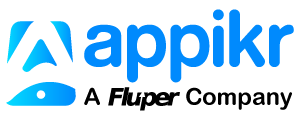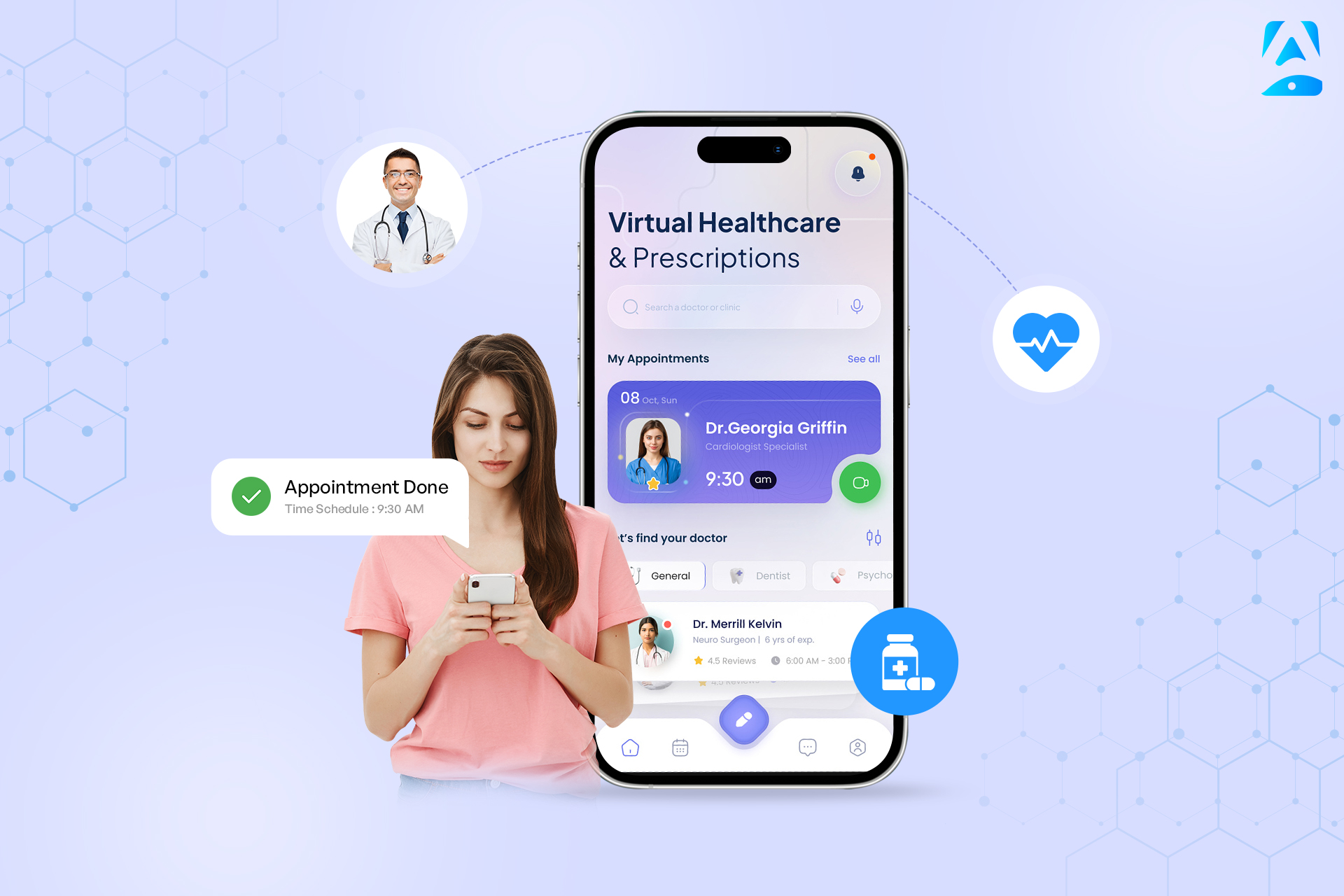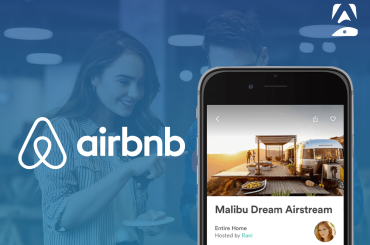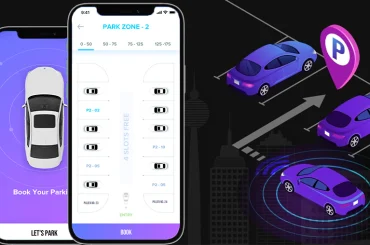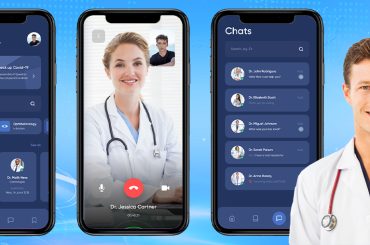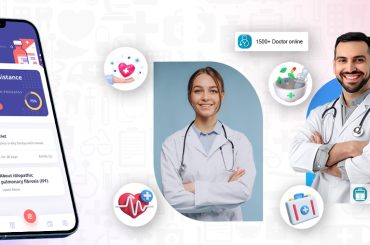Introduction
In today’s fast-paced world, convenience is key. And what could be more convenient than booking your doctor appointments with a few taps on your smartphone or tablet? This is a comprehensive guide will walk you through the step-by-step process of mobile app development of build a doctor appointment app, making healthcare more accessible and efficient for everyone.
Understanding the Need for a Doctor Appointment App
The foundation of any successful app is a deep understanding of the problem it solves. Before diving into development, it’s crucial to comprehend why such an app is essential in the first place. In today’s healthcare landscape, where time is of the essence and schedules are hectic, visiting a doctor can sometimes be a daunting task. A doctor appointment app simplifies this process, allowing users to book appointments, check doctor availability, and receive timely reminders effortlessly.
Planning Your Doctor Appointment App
Every successful app begins with a well-thought-out plan. In this phase, it’s essential to identify your target audience, determine your unique selling points, and outline the core features your app will offer. Understanding your users’ needs and pain points is paramount to your app’s success. Here are some key considerations:
-
User Persona:
Create detailed user personas to understand your potential users better. Consider factors like age, demographics, tech-savviness, and healthcare needs.
-
Unique Selling Proposition (USP):
Define what sets your app apart from existing solutions. Is it a user-friendly interface, an extensive network of doctors, or unique telemedicine features?
-
Feature Set:
Make a comprehensive list of features and prioritize them based on user needs and their significance to your app’s core functionality. Key features often include user registration, appointment scheduling, doctor profiles, appointment reminders, and possibly telemedicine options.
read also about:- https://www.appikr.com/blog/google-latest-apis-focus-fighting-climate-change-and-effects/
Choosing the Right Platform: Android Tablet App Development
For maximum reach and accessibility, consider developing your app for Android tablets. Android tablet app development extensive use makes it an excellent choice for reaching a broad audience. However, keep in mind that developing for tablet-sized screens requires careful consideration of design and layout to ensure a seamless user experience.
Building Features and Functionalities
Now, let’s delve deeper into the heart of your app—the features and functionalities that will make it a valuable tool for users. Features include:
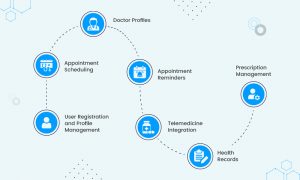
-
User Registration and Profile Management:
Implement a user-friendly registration process where users can create and manage their profiles. Include options for users to input their medical history, allergies, and insurance information for better healthcare management.
-
Appointment Scheduling:
Develop a straightforward and intuitive appointment scheduling system. Allow users to search for doctors by specialization, location, availability, and reviews. Enable them to select convenient appointment slots.
-
Doctor Profiles:
Create comprehensive profiles for healthcare providers, including their credentials, specializations, clinic details, and patient reviews. Detailed doctor profiles help users make informed choices.
-
Appointment Reminders:
Incorporate an automated appointment reminder system that sends notifications to users before their scheduled appointments. This helps reduce no-shows and ensures better patient compliance.
-
Telemedicine Integration:
In today’s digital age, telemedicine is becoming increasingly popular. Consider integrating telemedicine features that allow patients to consult with doctors remotely via video calls, chat, or phone.
-
Health Records:
Provide users with the option to securely store and access their health records within the app. Ensure compliance with healthcare data privacy regulations (such as HIPAA in the United States) to protect sensitive information.
-
Prescription Management:
Include a feature that allows doctors to electronically prescribe medications and users to access their prescriptions within the app. Users can send these prescriptions directly to pharmacies for hassle-free medication procurement.
Partnering with an IoT App Development Company
Incorporating Internet of Things (IoT) technology into your doctor appointment app can greatly enhance the overall user experience. IoT enables remote monitoring of patients and can provide real-time data to healthcare providers for more accurate diagnoses and treatment plans. Partnering with an IoT app development company like Appikr can provide the best healthcare solutions. They can help you integrate IoT seamlessly into your app, ensuring it operates flawlessly and securely.
Custom Mobile App Development: Bringing Your Vision to Life
Investing in custom mobile app development is essential to ensure your app aligns perfectly with your vision and offers a user-friendly and visually appealing experience. Here are the steps involved in custom mobile app development:
-
Conceptualization:
Work closely with your development team to refine your app concept and finalize the feature set.
-
Design and Prototyping:
Create wireframes and prototypes to visualize the app’s layout and user interface. User experience (UX) and user interface (UI) design are crucial aspects that impact the app’s usability and aesthetics.
-
Development:
Skilled developers will bring your app to life, coding its functionality and integrating the chosen features. Regular updates and progress reports will keep you informed throughout the development process.
-
Quality Assurance:
Thoroughly test your app to ensure it’s bug-free and user-friendly. Quality assurance includes functionality testing, security testing, and performance testing.
-
Feedback and Iteration:
Collect feedback from beta testers and make necessary adjustments. Iterate on the app to improve user experience and address any issues.
Testing and Quality Assurance
Always test before the development— it’s highly recommended! Quality assurance ensures that your app is robust, reliable, and user-friendly. Let’s go through the testing procedure:
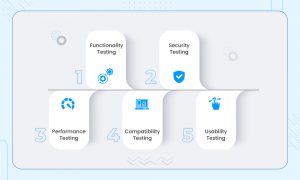
-
Functionality Testing:
Ensure that all features and functionalities work as intended. Test every user interaction, such as appointment booking, profile creation, and appointment reminders.
-
Security Testing:
Healthcare apps deal with sensitive patient data, so security is paramount. Perform security testing to identify and rectify vulnerabilities that could compromise user data.
-
Performance Testing:
Test your app’s performance under various conditions, including peak usage. Ensure it can handle high traffic without crashing or slowing down.
-
Compatibility Testing:
Verify that your app works smoothly on different Android tablet devices and screen sizes. Address any compatibility issues that arise.
-
Usability Testing:
Collect user feedback to evaluate the app’s user-friendliness. Make user-driven improvements to enhance the overall experience.
Launching Your Doctor Appointment App
With your app developed and thoroughly tested, it’s time to prepare for its launch. A successful launch involves several key steps:
-
Marketing:
Have a marketing plan for your app promotion. Consider leveraging digital marketing channels, social media, and healthcare partnerships to reach potential users.
-
User Support:
Set up user support channels, such as email, chat, or a hotline, to assist users with any questions or issues they may encounter.
-
App Store Optimization:
Optimize your app’s listings on app stores to improve discoverability. Use relevant keywords, create compelling app descriptions, and include eye-catching visuals.
-
Compliance:
Ensure your app complies with healthcare regulations and data privacy laws in your target regions. This may include adhering to HIPAA regulations in the United States or similar regulations in other countries.
Marketing and Growing Your User Base
Now that your app is live, your focus shifts to acquiring users and growing your user base. Here are some strategies to consider:
-
Promotions and Offers:
Always offer limited time promotions for best traffic. This can incentivize early adoption.
-
Healthcare Provider Partnerships:
Partner with healthcare providers, clinics, and hospitals to promote your app to their patients. Establishing professional relationships can lead to a broader user base.
-
User Reviews:
People love to hear others’ feedback. Make sure to get the best positive reviews from your customers. High ratings and positive reviews can boost your app’s credibility and visibility.
-
Content Marketing:
Create informative blog posts, videos, or infographics related to healthcare and appointment scheduling. Providing valuable content can attract users searching for healthcare information.
-
User Feedback and Improvements:
Continuously gather user feedback and make improvements based on their suggestions and pain points. Users appreciate apps that evolve to meet their needs.
Conclusion
Building your own doctor appointment app is an ambitious venture that can greatly benefit both patients and healthcare providers. By following this comprehensive step-by-step guide, investing in custom mobile app development, and incorporating IoT technology where relevant, you can create a valuable tool that simplifies healthcare access and improves the lives of many. As the healthcare landscape continues to evolve, your app can be at the forefront of positive change, offering convenience, efficiency, and improved healthcare experiences for all. Let Appikr build your med practice like a pro!
FAQs
Why develop a doctor appointment app?
Convenience is key. It simplifies appointment booking, checks doctor availability, and sends reminders for efficient healthcare access.
What to consider in app planning?
Think about user personas, unique selling points, and core features. Prioritize appointment scheduling, doctor profiles, and reminders.
Why choose Android tablet app development?
It reaches a wide audience, but design for tablet screens needs special attention.
What are key app features?
Registration, appointment scheduling, doctor profiles, reminders, telemedicine, health records, and prescription management.
How can IoT enhance the app?
IoT enables remote patient monitoring and real-time data for better diagnoses. Partner with Appikr for seamless integration.
